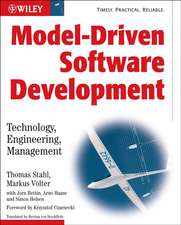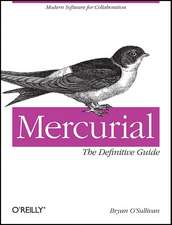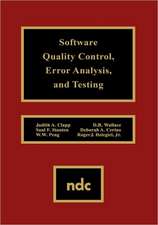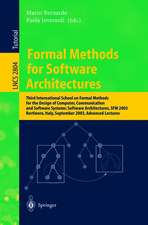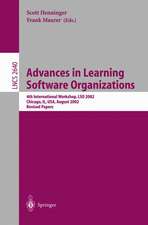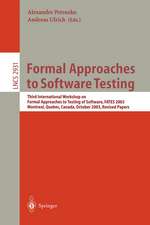Evolving Software Systems
Editat de Tom Mens, Alexander Serebrenik, Anthony Cleveen Limba Engleză Hardback – 28 ian 2014
With this book, the editors present insightful contributions on these and other domains currently being intensively explored, written by renowned researchers in the respective fields of software evolution. Each chapter presents the state of the art in a particular topic, as well as the current research, available tool support and remaining challenges. The book is complemented by a glossary of important terms used in the community, a reference list of nearly 1,000 papers and books and tips on additional resources that may be useful to the reader (reference books, journals, standards and major scientific events in the domain of software evolution and datasets).
This book is intended for all those interested in software engineering, and more particularly, software maintenance and evolution. Researchers and software practitioners alike will find in the contributed chapters an overview of the most recent findings, covering a broad spectrum of software evolution topics. In addition, it can also serve as the basis of graduate or postgraduate courses on e.g., software evolution, requirements engineering, model-driven software development or social informatics.
| Toate formatele și edițiile | Preț | Express |
|---|---|---|
| Paperback (1) | 652.07 lei 6-8 săpt. | |
| Springer Berlin, Heidelberg – 23 aug 2016 | 652.07 lei 6-8 săpt. | |
| Hardback (1) | 658.33 lei 6-8 săpt. | |
| Springer Berlin, Heidelberg – 28 ian 2014 | 658.33 lei 6-8 săpt. |
Preț: 658.33 lei
Preț vechi: 822.91 lei
-20% Nou
Puncte Express: 987
Preț estimativ în valută:
125.97€ • 131.53$ • 104.02£
125.97€ • 131.53$ • 104.02£
Carte tipărită la comandă
Livrare economică 15-29 aprilie
Preluare comenzi: 021 569.72.76
Specificații
ISBN-13: 9783642453977
ISBN-10: 364245397X
Pagini: 428
Ilustrații: XXIII, 404 p.
Dimensiuni: 155 x 235 x 28 mm
Greutate: 0.77 kg
Ediția:2014
Editura: Springer Berlin, Heidelberg
Colecția Springer
Locul publicării:Berlin, Heidelberg, Germany
ISBN-10: 364245397X
Pagini: 428
Ilustrații: XXIII, 404 p.
Dimensiuni: 155 x 235 x 28 mm
Greutate: 0.77 kg
Ediția:2014
Editura: Springer Berlin, Heidelberg
Colecția Springer
Locul publicării:Berlin, Heidelberg, Germany
Public țintă
ResearchCuprins
Part I Evolving Software Artefacts.- 1 An Overview of Requirements Evolution.- 2 Coupled Evolution of Software Meta models and Models.- 3 Software Product Quality Models.- Part II Techniques.- 4 Search Based Software Maintenance: Methods and Tools.- 5 Mining Unstructured Software Repositories.- 6 Leveraging Web 2.0 for Software Evolution.- Part III Evolution of Specific Types of Software Systems.- 7 Evolution of Web Systems.- 8 Runtime Evolution of Highly Dynamic Software.- 9 Evolution of Software Product Lines.- 10 Studying Evolving Software Ecosystems based on Ecological Models.- Part IV Appendices.- A Emerging Trends in Software Evolution.- B List of Acronyms.- C Glossary of Terms.- D Resources.- E Datasets.
Recenzii
From the reviews:
“This book will be a great asset to our professional community. … This book is worth reading, and would be of particular interest to practitioners (as well as quality assurance and testing professionals), managers, and instructors. I strongly recommend this book, and I’ve proudly added it to my collection of volumes on software evolution.” (Mordechai Ben-Menachem, Computing Reviews, May, 2014)
“This book will be a great asset to our professional community. … This book is worth reading, and would be of particular interest to practitioners (as well as quality assurance and testing professionals), managers, and instructors. I strongly recommend this book, and I’ve proudly added it to my collection of volumes on software evolution.” (Mordechai Ben-Menachem, Computing Reviews, May, 2014)
Notă biografică
Tom Mens is a professor leading the Software Engineering Lab at the Department of Informatics of the University of Mons in Belgium. He completed his PhD in Science in 1999 at the Vrije Universiteit Brussel on the topic of software evolution. His areas of expertise include studying the quality, complexity and refactoring of software, model-driven and empirical software engineering and human-machine interaction. With Anthony Cleve, he co-chairs the ERCIM Working Group on Software Evolution.
Alexander Serebrenik is an associate professor of software evolution at Eindhoven University of Technology (TU/e), The Netherlands. His areas of expertise include both technical and social aspects of software evolution and maintainability, as well as program analysis and transformation. He has been closely involved in a series of industrial projects pertaining to software maintainability assessment, and serves as Steering Committee member of the IEEE International Conference on Software Maintenance.
Anthony Cleve is an assistant professor of information system evolution at the University of Namur, Belgium. His research interests include data-intensive system maintenance and evolution, reverse engineering, program understanding, program transformation and self-adaptive systems. He received the IBM Belgium 2010 Award for his PhD thesis entitled "Program Analysis and Transformation for Data-Intensive System Evolution". He is co-chair of the ERCIM Working Group on Software Evolution.
Alexander Serebrenik is an associate professor of software evolution at Eindhoven University of Technology (TU/e), The Netherlands. His areas of expertise include both technical and social aspects of software evolution and maintainability, as well as program analysis and transformation. He has been closely involved in a series of industrial projects pertaining to software maintainability assessment, and serves as Steering Committee member of the IEEE International Conference on Software Maintenance.
Anthony Cleve is an assistant professor of information system evolution at the University of Namur, Belgium. His research interests include data-intensive system maintenance and evolution, reverse engineering, program understanding, program transformation and self-adaptive systems. He received the IBM Belgium 2010 Award for his PhD thesis entitled "Program Analysis and Transformation for Data-Intensive System Evolution". He is co-chair of the ERCIM Working Group on Software Evolution.
Textul de pe ultima copertă
During the last few years, software evolution research has explored new domains such as the study of socio-technical aspects and collaboration between different individuals contributing to a software system, the use of search-based techniques and meta-heuristics, the mining of unstructured software repositories, the evolution of software requirements, and the dynamic adaptation of software systems at runtime. Also more and more attention is being paid to the evolution of collections of inter-related and inter-dependent software projects, be it in the form of web systems, software product families, software ecosystems, or systems of systems.
With this book, the editors present insightful contributions on these and other domains currently being intensively explored, written by renowned researchers in the respective fields of software evolution. Each chapter presents the state of the art in a particular topic, as well as the current research, available tool support, and remaining challenges. The book is complemented by a glossary of important terms used in the community, a reference list of nearly 1,000 papers and books, and tips on additional resources that may be useful to the reader (reference books, journals, standards and major scientific events in the domain of software evolution, and datasets).
This book is intended for all those interested in software engineering, and more particularly, software maintenance and evolution. Researchers and software practitioners alike will find in the contributed chapters an overview of the most recent findings, covering a broad spectrum of software evolution topics. In addition, it can also serve as the basis of graduate or postgraduate courses on e.g., software evolution, requirements engineering, model-driven software development or social informatics.
With this book, the editors present insightful contributions on these and other domains currently being intensively explored, written by renowned researchers in the respective fields of software evolution. Each chapter presents the state of the art in a particular topic, as well as the current research, available tool support, and remaining challenges. The book is complemented by a glossary of important terms used in the community, a reference list of nearly 1,000 papers and books, and tips on additional resources that may be useful to the reader (reference books, journals, standards and major scientific events in the domain of software evolution, and datasets).
This book is intended for all those interested in software engineering, and more particularly, software maintenance and evolution. Researchers and software practitioners alike will find in the contributed chapters an overview of the most recent findings, covering a broad spectrum of software evolution topics. In addition, it can also serve as the basis of graduate or postgraduate courses on e.g., software evolution, requirements engineering, model-driven software development or social informatics.
Caracteristici
Comprehensive and tightly integrated presentation of the most recent findings on hot topics for software-intensive systems Equally balances technical issues with social and collaborative aspects Complemented by a huge reference list and pointers on related standards, datasets, conferences and other online material Includes supplementary material: sn.pub/extras

